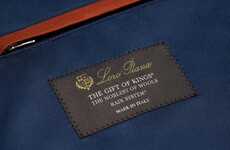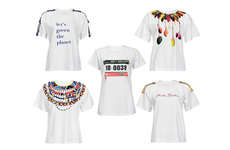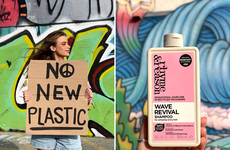
GANNI and Canopy Join Forces to Enhance Sustainability
References: just-style
GANNI has partnered with the non-profit organization Canopy on a forest-friendly fashion initiative. Through this collaboration, GANNI aims to enhance its sustainability practices by eliminating the use of materials sourced from climate-critical forests. This initiative focuses on ensuring that both the fashion brand's textiles and paper packaging avoid fibers from Ancient and Endangered Forests.
The forest-friendly fashion partnership is part of Canopy’s CanopyStyle and Pack4Good programs. As a B-Corp-certified company, GANNI aims to achieve a 50% absolute carbon reduction by 2027, with a focus on innovative, low-carbon materials like recycled fabrics and agricultural residue-based packaging.
This collaboration joins GANNI with over 550 other brands that have adopted CanopyStyle policies and aligns with the Pack4Good initiative, which has garnered support from 444 brands. By participating in these programs, GANNI seeks to contribute to a supply chain transformation that supports forest preservation and environmental sustainability.
Image Credit: GANNI x Canopy
The forest-friendly fashion partnership is part of Canopy’s CanopyStyle and Pack4Good programs. As a B-Corp-certified company, GANNI aims to achieve a 50% absolute carbon reduction by 2027, with a focus on innovative, low-carbon materials like recycled fabrics and agricultural residue-based packaging.
This collaboration joins GANNI with over 550 other brands that have adopted CanopyStyle policies and aligns with the Pack4Good initiative, which has garnered support from 444 brands. By participating in these programs, GANNI seeks to contribute to a supply chain transformation that supports forest preservation and environmental sustainability.
Image Credit: GANNI x Canopy
Trend Themes
1. Forest-friendly Fashion - The collaboration between GANNI and Canopy emphasizes the growing trend of fashion brands seeking sustainable alternatives to materials sourced from climate-critical forests.
2. Low-carbon Materials - Innovative use of recycled fabrics and agricultural residue-based packaging reflects a significant shift toward low-carbon materials in fashion.
3. Supply Chain Transformation - Brands are increasingly participating in initiatives like CanopyStyle and Pack4Good, signaling a broader effort to overhaul traditional supply chains for enhanced environmental sustainability.
Industry Implications
1. Sustainable Fashion - As fashion brands commit to using eco-friendly materials, the sustainable fashion industry is poised to grow significantly.
2. Recycling and Upcycling - The focus on recycled fabrics highlights the expanding industry's potential to reduce waste through innovative recycling and upcycling techniques.
3. Paper and Packaging - The demand for agricultural residue-based packaging illuminates opportunities within the paper and packaging industry to develop environmentally responsible alternatives.
6.2
Score
Popularity
Activity
Freshness






















